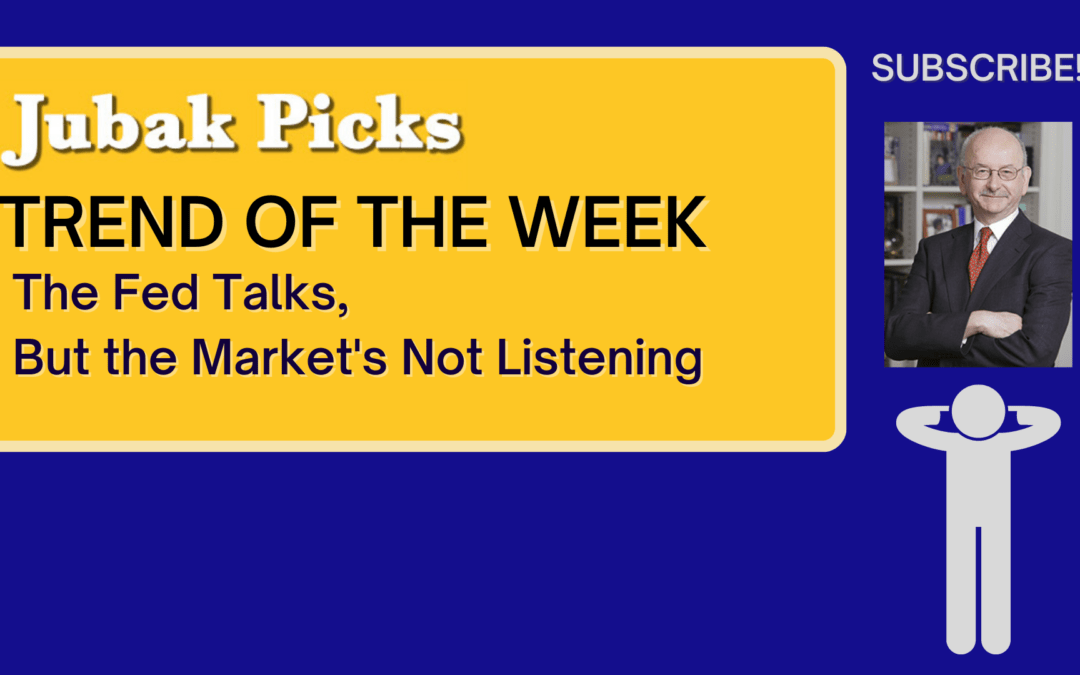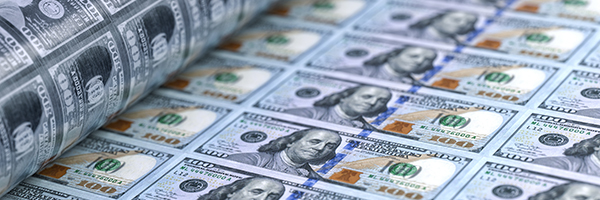
August 10, 2022 | Daily JAM, Morning Briefing |
The annual rate of inflation as measured by the headline Consumer Price Index (CPI) dipped in July to 8.5%. That was down from June’s annual rate of 9.1%. Economists had expected the inflation rate to drop to 8.7% However, the news wasn’t as positive on the core inflation front. This measure, which strips out more volatile energy and food prices rose at a 5.9% annual rate in July. That’s unchanged from the June rate. The divergence in the headline and core inflation numbers is all about gasoline.

August 8, 2022 | Daily JAM, Videos |
My one-hundred-and-sixty-fifth YouTube video “Trend of the Week The Fed Talks but the Market’s Not Listening” went up today. The market has strongly rallied in the last month, in good part on the optimistic belief in a “soft landing” from the Fed that controls inflation without a recession and puts an end to rate increases. The fact is, everything the Fed has said thus far indicates they plan to raise rates by an additional 1.5% in 2022 to fight inflation and that they are sticking to their 2% inflation goal in mind. When will the market start paying attention?

August 8, 2022 | Daily JAM, Friday Trick or Trend, Morning Briefing, UUP, Volatility |
In the last week, as odds have climbed of a 75-basis-point interest rate increase from the Federal Reserve at its September 22 meeting, the U.S. dollar has reversed its slide during the last two weeks of July.
Stands to reason. Higher U.S. interest rates make dollar-denominated assets, such as Treasuries, more attractive. More dollar buying, stronger dollar.

August 6, 2022 | Daily JAM |
I expect that all eyes will be on the July CPI inflation (Consumer Price Index) report due on Wednesday, August 10, before the market open. The market hope is that we’ll see the first signs that inflation has peaked after the headline CPI inflation surged at a 9.1% annual rate in June.

August 3, 2022 | Daily JAM, Morning Briefing |
Credit card debt rose in the United States from April through June by $46 billion, a 5.5% increase over the first quarter, as Americans borrowed billions of dollars to continue spending, according to a report on Tuesday, August 2, from the Federal Reserve Bank of New York. The increase of 13% from the second quarter of 2021 to the second quarter of 2022 was the biggest jump in more than 20 years.
July 27, 2022 | Daily JAM |
This afternoon the Federal Reserve raised its benchmark interest rate by 75 basis points to a range of 2.25% to 2.50%. It was the second straight 75 basis don’t increase and the fourth increase in interest rates this year. Stocks soared. The Standard & Poor’s 500 closed up 2.62% and the Dow Jones Industrial Average ended up 1.37%. The NASDAQ Composite gained 4.06 and the NASDAQ 100 finished ahead by 4.26%. The small-cap Russell 2000 added 2.39% at the close. And why? you might well ask. Let me posit three reasons.

July 24, 2022 | Daily JAM, Morning Briefing |
This is the way interest rate increases from the Federal Reserve work: Higher rates hit the housing market first as mortgages get more expensive and buyers figure they’ve been priced out of the market–for this cycle.
And that’s exactly what we’re seeing in the housing market right now. On Thursday D.R. Horton (DHI), the largest U.S. homebuilder, reported that in its most recent quarter cancellations of orders for new homes climbed to their highest level in three years. The company said its cancellation rate in its most recent quarter was 24%, up from 17% during the same quarter last year.
July 23, 2022 | Daily JAM |
This week brings an interest rate decision from the Federal Reserve (75 basis point increase?), market reaction to the Russian attack on Ukraine’s major grain port, and earnings from Alphabet, Microsoft, Amazon, and Apple. Here’s my preview of what we might see–or at least what to look for–this week.

July 17, 2022 | Daily JAM, Friday Trick or Trend |
The dollar is likely to get another boost from the Bank of Japan and the European Central Bank this week. On Thursday, the European Central Bank is likely to report its first interest-rate increase in more than a decade. But the increase is likely to be just 25 basis points. That will be a stark reminder of how far behind the Federal Reserve, which raised interest rates 75 basis points in June and is expected to increase rates by another 75 basis points at its July 27 meeting. On Thursday the Bank of Japan is expected to keep its benchmark interest rates at its current low, low, low level.

July 14, 2022 | Daily JAM, Videos |
My one-hundred-and-fifty-seventh YouTube video “Inflation isn’t about to get better” went up today. Yesterday, we had new CPI inflation numbers, and the bar keeps pushing higher with annual inflation reaching 9.1% in June. I think if you are making investing plans based on an expectation that inflation will be getting better soon, you’re flat out wrong. Here’s why: the Russian invasion of Ukraine continues to drive up commodity prices across the board, which will keep having a huge impact on inflation numbers. People are now expecting a 1% increase in interest rates from the Fed at the July meeting. The size of that move is an indication of exactly how difficult the Fed thinks it will be to get inflation under control.

July 14, 2022 | Daily JAM, Morning Briefing |
After Wednesday’s report that CPI inflation hit an annual 9.1% rate in June, a 100-basis-point interest rate increase at the Federal Reserve’s July 27 meeting is on the table. (Which is literally what Atlanta Fed President Raphael Bostic told reporters yesterday: “Everything is in play,” he said. Asked if that included raising rates by a full percentage point, he replied, “It would mean everything.)

July 13, 2022 | Daily JAM, Morning Briefing |
It’s not the kind of historical comparison you want to hear. Inflation, as measured by the Consumer Price Index (CPI rose at a 9.1% annual rate in June. That was the highest annual rate since November 1981. (Just as the Volcker Fed was raising interest rates to 14% to finally break inflation.) Economists had been expecting inflation of 8.8%. Which would still have been an increase from May’s 8.6% headline rate.











